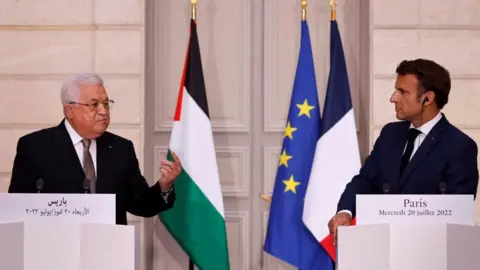French President Emmanuel Macron recently announced that France will officially recognize the State of Palestine in September. This significant diplomatic move is set to be formally declared during the upcoming session of the United Nations General Assembly taking place in New York. The announcement came during a post he shared on social media platform X, where Macron emphasized the urgent necessity to bring an end to the ongoing conflict in Gaza and highlighted the plight of its civilian population. “Peace is possible,” he stated, calling for an immediate ceasefire, the release of hostages, and the provision of substantial humanitarian aid to those affected by the conflict.
The France’s decision has been met with mixed responses. Palestinian officials have expressed their gratitude and welcomed Macron’s move, while Israeli Defence Minister Israel Katz fiercely condemned it, labeling the recognition as a “disgrace and a capitulation to terrorism.” Such divergent reactions underscore the controversial nature of the Palestinian statehood issue and the geopolitical tensions that surround it.
In his post, Macron reaffirmed France’s long-standing commitment to achieving a fair and lasting peace in the Middle East. He made it clear that the recognition of Palestine went hand in hand with ensuring the demilitarization of Hamas, emphasizing the need to secure and rebuild Gaza. Furthermore, Macron argued for the establishment of a viable Palestinian state that is committed to recognizing Israel, suggesting that such steps are paramount for the overall security of the region. Following this proclamation, Macron sent a letter to Palestinian Authority President Mahmoud Abbas, formally conveying France’s decision.
Hussein al-Sheikh, who is Abbas’s deputy, praised Macron’s initiative, stating that it aligns with France’s commitment to international law and the rights of the Palestinian people to self-determination. On the other hand, Katz condemned the French action, claiming that it rewards the perpetrators associated with Hamas, particularly in light of the violent conflict that escalated after Hamas’s attack on Israel on October 7, 2023, which resulted in significant casualties and hostages.
To date, more than 140 of the 193 UN member states recognize the State of Palestine, with several European Union countries, including Spain, among those who support Palestine’s statehood. Conversely, key allies of Israel, particularly the United States and the United Kingdom, along with some other nations, have refrained from recognizing Palestine as an independent state. Israeli officials contend that granting statehood to Palestine amidst the ongoing terrorism associated with Hamas undermines anti-terrorism efforts.
The violence in Gaza has escalated dramatically since the October attacks, with the Israeli military launching extensive operations in response to the assault, resulting in staggering casualties. Reports indicate that approximately 59,106 individuals have lost their lives in Gaza in the ensuing conflict, adding to a prevalent humanitarian crisis that has been termed catastrophic by many international observers.
Even the United Nations’ Palestinian refugee agency, known as UNRWA, reported alarming statistics, including that one in five children in Gaza City now suffers from malnutrition. This dire situation has prompted over 100 international humanitarian and human rights organizations to issue warnings regarding a potential mass starvation crisis in the Gaza Strip, urging governments worldwide to take decisive actions.
In a parallel response, UK Prime Minister Sir Keir Starmer condemned the pitiable humanitarian conditions prevailing in Gaza, calling them “unspeakable and indefensible.” He remarked that the situation has deteriorated to unprecedented levels, highlighting the ongoing humanitarian catastrophe in the region.
As the world watches this development unfold, the ramifications of France’s decision and the state of the Palestinians amid rising tensions continue to play out, echoing the broader challenges of achieving peace and stability in the region. The prospect of establishing a recognized Palestinian state now hangs in a delicate balance, influenced by the complex interplay of international politics and regional hostilities involving Israel, Palestine, and their respective supporters.












